We are developing the social individualist meta-context for the future. From the very serious to the extremely frivolous... lets see what is on the mind of the Samizdata people.
Samizdata, derived from Samizdat /n. - a system of clandestine publication of banned literature in the USSR [Russ.,= self-publishing house]
|
Rand Simberg and I left his house in LA at a time he predicted would be optimal from a traffic standpoint, and as he used to commute to work at Rotary Rocket several times a week in the Nineties, he ought to know. We were in rain and overcast until one set of hills before Mojave when the Native American gods blessed the undertaking with a full rainbow bridge. Since photo ops of this sort are not easily scheduled with higher authorities, Rand pulled over.
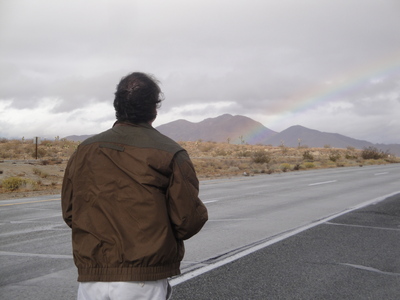
Rand Simberg peers intently into the distance in hopes of spotting the pot of gold we need for our Wyoming Aerospace venture
Photo: copyright Dale Amon, All Rights Reserved
I have not been up to Mojave for a few years and some things have changed. The gate guardian Phantom is now at the airport entry, and it has been joined by a rather rare 1960’s vintage Convair airliner. Most striking to me was Roton standing proud not far from the main building. The first time I saw it was inside the Rotary Rocket High Bay back in 1999 and at that time I was only allowed to record it in my memory.
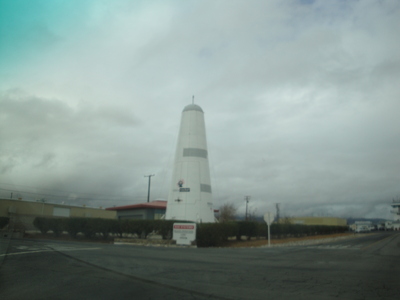
Roton is the first commercial space Gate Guardian that I am aware of
Photo: copyright Dale Amon, All Rights Reserved
Those who have been around the space scene for awhile will remember the Space Studies Institute. It was once a major player but seemed to fade out over the last 15 years and some thought it had died completely. Not so! Lee Valentine and Robin Snelson have moved it from Princeton to an office inside the terminal just behind Rand.
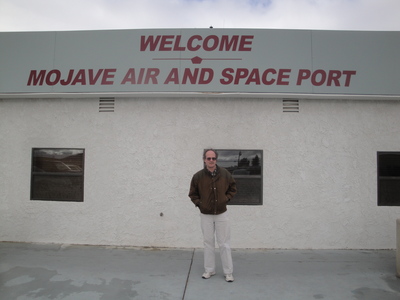
Obligatory tourist style photo of Rand. As if he has not been here a few thousand times before…
Photo: copyright Dale Amon, All Rights Reserved
First stop was the Voyager restaurant, an amenity that is fairly recent. Lunch used to require a trip into town. The first thing I noticed coming in the door was that I knew a large fraction of the people there; the second thing I noticed was the private jet parked just outside with a G-number and a Virgin logo. I wonder who that might belong to?

Familiar faces in the lunch crowd at the Voyager.
Photo: copyright Dale Amon, All Rights Reserved

Care to hazard a guess at the owner?
Photo: copyright Dale Amon, All Rights Reserved
After chatting awhile in the lounge we found that someone was over in the SSI office and we could connect to the net or work from there if we wished. As it turned out, we mostly just talked and looked over the large collection of commercial and space industrialization books lining the walls.
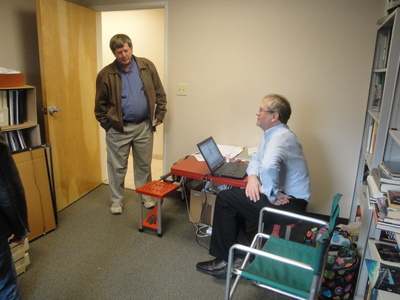
Just hangin at the SSI office.
Photo: copyright Dale Amon, All Rights Reserved
In the next installment I will cover the visit with our old friends and colleagues at XCOR.
You can find an intro article here.
As we await the UK government’s financial statement known as the Pre-Budget Report, expected to be full of stuff designed to appease Labour’s so-called “base” of banker haters, I have been re-reading Ludwig von Mises’ classic explanation of why there has been so much hatred for markets and business down the years from the likes of intellectuals and their media outlets. Some of the names and examples will be a little dated – who now remembers such old monsters like Harold Laski? – but the message is as pertinent as ever.
In an earlier posting today, I expressed the fear that this Copenhagen nonsense would lead to quite a few more stupid laws. But the news right now seems to be rather better than that:
The UN Copenhagen climate talks are in disarray today after developing countries reacted furiously to leaked documents that show world leaders will next week be asked to sign an agreement that hands more power to rich countries and sidelines the UN’s role in all future climate change negotiations.
If this shindig can be a total fiasco I really do not care why (for his own idiot reasons this guy agrees). Sadly, I fear that this leak may just be negotiation as usual. The bodge that results will still probably be pretty terrible.
On the other hand, maybe the rich countries do not actually want a deal. Reading that Guardian report, you can almost hear the rich country negotiators muttering amongst themselves that they would prefer to stay rich. But maybe that is a step too far towards being sensible, and too much to hope for.
Fingers crossed.
This evening I am doing a recorded conversation with Bishop Hill, and by way of preparation have been rootling around in his archives. And I just came across this, which the Bishop posted on November 19th 2006:
In this connexion the thing to be remarked is that the Whigs proceeded by the negative method of repealing existing laws, not by the positive method of making new ones. They combed the Statute-book, and when they found a statute which bore against “the liberty of the subject” they simply repealed it and left the page blank. This purgation ran up into the thousands. In 1873 the secretary of the Law Society estimated that out of the 18,110 Acts which had been passed since the reign of Henry III, four-fifths had been wholly or partially repealed.
Excellent, apart from the odd spelling of “connection”.
That’s not by Bishop Hill himself. It was recycled from somewhere called “Outside Story”, the link to which no longer works. But there’s no reason to doubt theis particular story, which should now inspire us all. For too long we have been ruled by politicians who measured their success by how many laws they could pass. Because of these fools, we now need politicians who measure their success by how many laws they can unpass.
Bishop Hill’s latest posting, as I write this, is to this. Well worth reading. Climategate is not nearly over. It is just getting into its stride. At Copenhagen, lots of laws, seemingly unshiftable from then on, will be made, maybe not as many as would have happened without Climategate, but still, most of us here surely fear, a lot. But the point is: laws can be unmade. There can be, and there must soon be, another great purgation.
George Monbiot, who the other day voiced anger at the misbehaviour of so-called scientists at the University of East Anglia’s climate resarch unit, has reverted to his original mode of George Moonbat by attacking AGW skeptics as deniers who want to dupe the public in the service of Big Oil. It does not occur to this man that he, and others like him, also have made a very nice living out the AGW story. After all, research grants and academic careers have been built on it. Where’s there is muck, there is brass, as they say.
There is a whiff of desperation in the air from these guys, who resemble nothing so much as a bully confronted by those whom he or she has tormented. Opinion polls like this one show high levels of skepticism among the public about the claims made by alarmists, and the fact that the climate has not, on average, warmed up at all since 1998, is not quite helping their cause.
Monbiot and others like him need to drop the hysteria, the smugness, the bullying and the rest of it. They need to grasp the fact that their predictions are debatable and that the CRU leaks are intensely damaging to their agenda.
Even a BBC Breakfast TV presenter, who normally has all the interviewing manner of a soft cuddly toy, asked a guy on the show yesterday about “whether the UEA leaks are undermining the Copenhagen process”. This story is not going away.
The world’s first commercial spaceship was unveiled and christened today at Mojave. I will post more when I have slept and caught my flight home, but here is just one photo of the very full day of activities. I did not have as much time as Rand Simberg to get articles out due the large number of hats I was wearing today. I was also not official press although I could have slipped in as most of the annointed press knew me and would have said nothing
In any case, I will have more to say and I have hundreds of photos. Here is just one.

Christening of the VSS Enterprise.
Photo: copyright Dale Amon, All Rights Reserved
According to Peter Hitchens:
The Atheists must reject Christianity as well as Islam. Alas, for them, Islam responds to their rejection by ignoring them, whereas Christianity tends to retreat before them. And a weakened church laces a vacuum into which Islam can move. Result? The growing power of Islam in our society, our culture, our government, our political parties and our schools, so that an essentially Atheist state pays increasing obeisance to Islam. I’ve said it before and I’ll say it again, the new Atheists, by attacking Christianity, are simply clearing a space for Islam to establish itself in the space they have swept and garnished.
Discuss.
Traditional journal based scientific peer review works as follows. A researcher does his research and writes his paper. He then submits the paper to the editor of a journal. The editor of the journal then sends the paper to a number (usually two or three) of other researchers in the same field. These researchers then write short reports on the paper outlining what is good or bad about it and usually suggesting improvements, along with a recommendation as to whether the paper should be accepted by the journal. The reports are then forwarded to the author of the paper, who responds to suggested changes and then sends a revised version of the paper to the journal. After possibly several repetitions of this, an accepted paper will eventually be published in the journal.
Referees are supposedly anonymous. However, the author, the editor, and the referees often work in small fields where everybody knows one another, and people’s beliefs, foibles and writing styles are often well known, so this anonymity is often more theoretical than real. The theoretical reason for anonymity – that the referee can say what he pleases without consequences – is not always entirely true. The anonymity is one sided: the referee receives a paper with the name of the author at the top. The name of a famous and influential scientist at the top has an impact. The editor is very powerful, as he gets to select the referees and by choosing referees carefully clearly has influence whether a paper will be published or not. A good editor will choose referees of mixed levels of seniority (referees include everybody from graduate students to senior professors), and (in areas of some dispute) of mixed positions in any argument.
There are various ways in which this process can be corrupted, but (certainly in the field I worked in) this generally did not happen. Publishers of journals made a point of appointing people of integrity as editors. It was in their self-interest to do this, because the long term consequences of not doing so would be a loss of credibility for the journal. The danger, always, is that authors, editors, and referees all end up coming from the same clique, in which such a process can be corrupted.
Another danger is that fields become isolated from each other, and workers in one field do not properly absorb knowledge and techniques from other fields. Many scientists (and non-scientists) for that matter use a great deal of statistics in their work, and do a great deal of computer programming in their work. Often, they will not be experts in either statistics or computer programming. Sometimes they will do good work from a statistical perspective, and write good computer code. On the other hand, if their work is to be published in peer reviewed journals, and the referees for the papers selected by those peer reviewed journals are not experts in statistics or computer science, and use similarly sloppy methods themselves, then poorer quality work can at times be gotten away with (similarly, you should beware of anyone in business or finance who tells you that his “proprietary black box model” tells this, and that he cannot show it to you because it is “proprietary”. Similar situations of sloppy code and statistics are endemic here, too).
The obvious point is that, when relevant, the peers who do the peer review should include statisticians and computer scientists as well as other workers in the precise field as the author of the paper. Science has become very specialised, and specialists in the same field do not talk to experts in other fields nearly often enough. However, the techniques different scientists use are not nearly as specialised as many proponents think they are. With some effort, experts in one field can understand the work of experts in another.
Traditional peer review does not encourage this.
Which is why in many of the most rigorous, competitive fields, in which really good, high quality science is done, traditional peer review has lost much of its relevance.
Some history… → Continue reading: Peer review and open science
Bishop Hill, who has been working overtime to keep apace with the whole University of East Anglia climate change kerfuffle, has this remarkable example of how some journalists have been threatened by AGW alarmists. How lovely.
By the way, as a native of East Anglia, I feel ashamed of how my region has been tainted by these arseholes. When the UEA was originally built back in the 1960s, it was constructed, much to my father’s chagrin, on a golf course. Given the collapse in that institution’s reputation as a result of the emails, perhaps it should revert to golf and do less harm to what remains of the UK’s intellectual life.
As far as I know, it was my very good friend Sean Gabb who first posited a theory about who may be responsible for the hacking of the CRU e-mails that have now formed the basis of ‘Climategate’:
In short, I believe the Russians are behind this. It may be that all those megabytes of data were stolen by a computer hacker. There may be any number of people who are up to such hacking in the technical sense. But this seems to have been an integrated operation. Having the technical skills to get access to a computer archive is not the same as knowing where to look in that archive and what to look for. Nor is it the same as knowing what to do with it.
But the Russians had means and opportunity to do the job. Perhaps their security services are no longer as efficient and as well-funded as in Soviet times. But they are still there. Their mission is no longer to win the Cold War. But making life easier for Mr Putin and his friends is a large mission in itself.
I have no idea whether or not there is any truth in this. Certainly the Russian state has plenty of motivation but then so do a host of others. Sean offers very little in the way of evidence because there is very little in the way of evidence.
But, interestingly, there are some tufts of corroboration emerging:
Suspicions were growing last night that Russian security services were behind the leaking of the notorious British ‘Climategate’ emails which threaten to undermine tomorrow’s Copenhagen global warming summit.
An investigation by The Mail on Sunday has discovered that the explosive hacked emails from the University of East Anglia were leaked via a small web server in the formerly closed city of Tomsk in Siberia.
Have they merely read and then embellished Sean’s article I wonder? Or is there some flickering fire to accompany this smoke? The evidence is, at best, circumstantial.
But what if it does turn out to have been the former KGB? Would it not be an irony of historic proportions that an organisation formerly devoted to establishing a global tyrrany has thrown a big hammer-and-sickle into the works of their would-be successors? And, not just ironic, but also just.
Because if the warm-mongers get their way, then it is not the powerful and the well-connected that need fear their zealotry. The Al Gores and Zac Goldsmiths of the world can afford to bask in the green glow of personal glory, safe in the knowledge that their opulent lifestyles will not be compromised by so much a sterling silver napkin ring. They will soar (both literally and metaphorically) above it all. No, it is the Average Joe/Jane who will be forced to endure the austerity that their new overlords will demand. It is those who struggle to make ends meet who will be told that the planet can no longer afford their humble family saloon or their two weeks a year in the Algarve. It is the little people who will be stepped upon because they can be stepped upon.
Maybe, one day, we will know the true identity of the e-mail hackers. Or maybe we will never know. But I do sort of hope that it does turn out to be some guy called Yvgeny, acting on orders from the Kremlin, tapping away in a windowless room in a drab building on a military base in Krasnoyarsk because then, we will be able to say: congratulations, tovarisch! You have, at long last, established yourself as a Hero of the Proletariat.
I’ve just watched the Channel 4 Sky news video clip to be seen here, in which Bob Ward, policy director at the Grantham Research Institute on Climate Change and the Environment, berates Fraser Nelson, editor of the Spectator, thus:
“… it’s remarkable how the so-called sceptics have been using this as a propaganda tool to promote a political end … People with a clear vested interest in creating public confusion because they want to undermine action on climate change, they should shut up and wait until the investigation is done rather than carry on a witch hunt.”
Fraser Nelson took exception to this, in particular because Fraser Nelson thinks that AGW is quite a bit truer than I now think it is. In other words, said Fraser Nelson, he is a true sceptic, rather than a “so-called sceptic”.
However, if Bob Ward had been shouting at someone like me, instead of at Fraser Nelson, as in his own mind he surely was, then he would have had a point. I definitely want the whole AGW thing to collapse in ruins, and suspect that it quite soon may collapse. In the meantime, I definitely do dislike all the regulations and taxes that Bob Ward and co want to see introduced, and I am most definitely using Climategate as a propaganda tool to promote that political end. I certainly prefer the current state of public confusion about climate science to the public unanimity that this confusion has now replaced. Insofar as I had any tiny part in helping to create and spread such confusion, and I did, I am a proud man.
But, as the true object of Bob Ward’s ire, I do have some incidental disagreements with him.
→ Continue reading: Bob Ward says we should shut up!
I attended Alan Boyle’s book release signing tonight amongst a group of familiar faces. As such things go, this one was a great deal of fun as attendees were actually rather familiar with the material and the debate to which Alan has taken the ‘Pluto is a Planet’ side. If you are interested in the history of the whole debate over what is a planet according to astronomers, this is a worthwhile addition to your shelf.
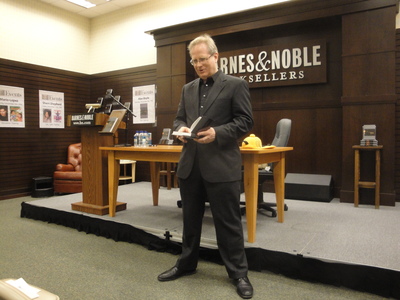
Alan Boyle reading from his newly released book, “The Case For Pluto” at Barnes and Nobles in The Grove in LA.
Photo: copyright Dale Amon, All Rights Reserved
Alan’s book release also presents me with the excuse I have been waiting for to throw in my tuppence in this ‘debate’.
For astronomical purposes, the reclassification of Pluto to officially be a scare quoted ‘Dwarf Planet’ is useful. I can also admit their classification of every element other than Hydrogen and Helium as a metal might also be useful… to them. On the other hand, neither classification is of much use to anyone else. Oxygen might be an astronomer’s metal, but to one like myself whose undergraduate degree was in Electrical Engineering, this method of sorting elements is rather silly. astronomer’s definition of planet is likewise rather worthless outside their discipline.
For those of us who look upon space as a place for settlement, commerce, and a source of resources to feed a solar system wide industrial economy, knowing whether a body clears its orbit of other matter is a “So what?” issue. Settlement and industry have different concerns and will most likely require a more complex system of classification. A planet with a thousand kilometer deep atmosphere that gradually turns to a liquid and then a solid phase is not useful for the same things as a body with a rocky surface. There may be temperate bodies out there covered with hundred mile deep oceans of water; there may be ones with molten rock surfaces. Each presents unique characteristics to the future explorer or industrialist.
From my point of view a planet has sufficient gravity to make it round-ish. Ceres and many of the new bodies outside of Pluto’s orbit are therefore planets in my book. I propose that just as Electrical Engineers ignore the astronomer’s definition of metal, the rest of us should ignore their definition of planet as well.
|
Who Are We? The Samizdata people are a bunch of sinister and heavily armed globalist illuminati who seek to infect the entire world with the values of personal liberty and several property. Amongst our many crimes is a sense of humour and the intermittent use of British spelling.
We are also a varied group made up of social individualists, classical liberals, whigs, libertarians, extropians, futurists, ‘Porcupines’, Karl Popper fetishists, recovering neo-conservatives, crazed Ayn Rand worshipers, over-caffeinated Virginia Postrel devotees, witty Frédéric Bastiat wannabes, cypherpunks, minarchists, kritarchists and wild-eyed anarcho-capitalists from Britain, North America, Australia and Europe.
|











